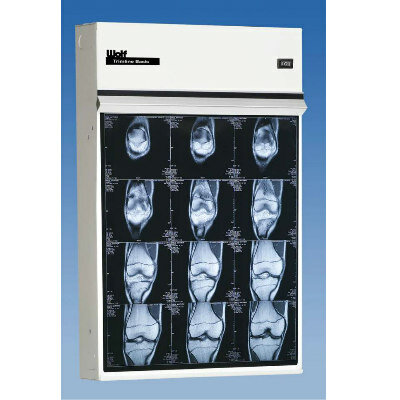GE Healthcare to Aid Modernization of Kenyan Hospitals
|
By HospiMedica International staff writers Posted on 11 Mar 2015 |

Image: James Macharia and Farid Fezoua sign the agreement presided over by Kenyan President Uhuru Kenyatta (Photo courtesy of GE Healthcare).
The Kenyan Ministry of Health (Nairobi, Kenya) has selected GE Healthcare (GE; Little Chalfont, United Kingdom) as a strategic partner for modernizing radiology services throughout the country.
Under the Kenyan national healthcare programme, GE will be involved in the modernization of radiology infrastructure in 94 hospitals across 47 counties, as well as in four national referral hospitals in the country. The agreement includes a long-term service contract, under which GE will install 585 units of diagnostic imaging equipment in the facilities, including X-ray and ultrasound systems. The radiology modernization is the largest of the seven part program of the Kenyan Government's healthcare transformation programme, with an estimated investment of USD 420 million.
GE will also establish a healthcare training center that will be operated jointly with an accredited local partner. The training center, the first of its kind to be established in Africa, will support training and education programs focusing on skills development and capacity building. The agreement between the Kenyan government and GE Healthcare is part of an ambitious healthcare reform, one of the main pillars in the Kenyan Vision 2030 Plan to transform Kenya into a rapidly industrializing middle-income nation by 2030.
“Disease patterns in Kenya are evolving, as are the needs of the healthcare system. In response to this, a central pillar of the health transformation strategy is aimed at strengthening preventative health services to help improve the long-term health outlook of the general population,” said Kenyan cabinet secretary for health James Macharia. “By increasing access to preventative screenings, we aim to aid doctors in better detecting, diagnosing and treating non-communicable diseases, including cancer and cardiovascular disease, at an early stage. As a leading global healthcare provider, we believe GE Healthcare is ideally placed to serve as our partner to deliver on this vision for earlier health.”
“Sustainable healthcare transformation requires a system-wide approach combining technology, capability building including training, service and maintenance, as well as long-term financing,” said Farid Fezoua, president of GE Healthcare Africa. “To that end, we are grateful to His Excellency, President Uhuru Kenyatta, the Cabinet Secretary, Mr. James Macharia, and the Ministry of Health, for their confidence in the competencies that GE can bring to improve system and patient outcomes, and we are deeply committed to ensuring the long-term impact and success of this transformation program.”
Related Links:
Kenyan Ministry of Health
GE Healthcare
Under the Kenyan national healthcare programme, GE will be involved in the modernization of radiology infrastructure in 94 hospitals across 47 counties, as well as in four national referral hospitals in the country. The agreement includes a long-term service contract, under which GE will install 585 units of diagnostic imaging equipment in the facilities, including X-ray and ultrasound systems. The radiology modernization is the largest of the seven part program of the Kenyan Government's healthcare transformation programme, with an estimated investment of USD 420 million.
GE will also establish a healthcare training center that will be operated jointly with an accredited local partner. The training center, the first of its kind to be established in Africa, will support training and education programs focusing on skills development and capacity building. The agreement between the Kenyan government and GE Healthcare is part of an ambitious healthcare reform, one of the main pillars in the Kenyan Vision 2030 Plan to transform Kenya into a rapidly industrializing middle-income nation by 2030.
“Disease patterns in Kenya are evolving, as are the needs of the healthcare system. In response to this, a central pillar of the health transformation strategy is aimed at strengthening preventative health services to help improve the long-term health outlook of the general population,” said Kenyan cabinet secretary for health James Macharia. “By increasing access to preventative screenings, we aim to aid doctors in better detecting, diagnosing and treating non-communicable diseases, including cancer and cardiovascular disease, at an early stage. As a leading global healthcare provider, we believe GE Healthcare is ideally placed to serve as our partner to deliver on this vision for earlier health.”
“Sustainable healthcare transformation requires a system-wide approach combining technology, capability building including training, service and maintenance, as well as long-term financing,” said Farid Fezoua, president of GE Healthcare Africa. “To that end, we are grateful to His Excellency, President Uhuru Kenyatta, the Cabinet Secretary, Mr. James Macharia, and the Ministry of Health, for their confidence in the competencies that GE can bring to improve system and patient outcomes, and we are deeply committed to ensuring the long-term impact and success of this transformation program.”
Related Links:
Kenyan Ministry of Health
GE Healthcare
Latest Hospital News News
- Nurse Tracking System Improves Hospital Workflow
- New Children’s Hospital Transforms California Healthcare
- Noisy Hospitals Face Threat of Decreased Federal Compensation
- Orthopedics Centre of Excellence Planned for Guy’s Hospital
- Research Suggests Avoidance of Low-Value Surgical Procedures
- U.S. Federal Readmission Fines Linked to Higher Mortality
- Columbia China to Build New Hospital in Jiaxing
- Dubai Debuts Second Robotic Pharmacy Service
- Seattle Hospital Network Shifts Away from Overlapping Surgeries
- ACC to Launch Valvular Heart Disease Program in China
- Mortality Rates Lower at Major Teaching Hospitals
- South Australia to Inaugurate Upscale Hospital
- Raffles to Launch Second Hospital Project in China
- Research Center Tackles Antimicrobial Drugs Challenge
- Miami Cardiac & Vascular Institute Completes Expansion Project
- Hospital Antibiotic Policies Improve Prescription Practices
Channels
Artificial Intelligence
view channel
AI-Powered Algorithm to Revolutionize Detection of Atrial Fibrillation
Atrial fibrillation (AFib), a condition characterized by an irregular and often rapid heart rate, is linked to increased risks of stroke and heart failure. This is because the irregular heartbeat in AFib... Read more
AI Diagnostic Tool Accurately Detects Valvular Disorders Often Missed by Doctors
Doctors generally use stethoscopes to listen for the characteristic lub-dub sounds made by heart valves opening and closing. They also listen for less prominent sounds that indicate problems with these valves.... Read moreCritical Care
view channel
AI to Improved Diagnosis of Atrial Fibrillation
Abnormal heart rhythms frequently arise from—and contribute to—structural abnormalities in the heart. Atrial fibrillation is a specific type of abnormal rhythm that may not be consistently present, often... Read more
Stretchable Microneedles to Help In Accurate Tracking of Abnormalities and Identifying Rapid Treatment
The field of personalized medicine is transforming rapidly, with advancements like wearable devices and home testing kits making it increasingly easy to monitor a wide range of health metrics, from heart... Read more
Machine Learning Tool Identifies Rare, Undiagnosed Immune Disorders from Patient EHRs
Patients suffering from rare diseases often endure extensive delays in receiving accurate diagnoses and treatments, which can lead to unnecessary tests, worsening health, psychological strain, and significant... Read moreSurgical Techniques
view channel
Tiny Wraparound Electronic Implants to Revolutionize Treatment of Spinal Cord Injuries
The spinal cord functions as a vital conduit, transmitting nerve impulses to and from the brain, much like a highway. When the spinal cord is damaged, this flow of information is disrupted, leading to... Read more
Small, Implantable Cardiac Pump to Help Children Awaiting Heart Transplant
Implantable ventricular assist devices, available for adults for over 40 years, fit inside the chest and are generally safer and easier to use than external devices. These devices enable patients to live... Read moreGastrointestinal Imaging Capsule a Game-Changer in Esophagus Surveillance and Treatment
A newly-developed gastrointestinal imaging capsule is poised to be a game-changer in esophagus surveillance and interventions. The Multifunctional Ablative Gastrointestinal Imaging Capsule (MAGIC) developed... Read more
World’s Smallest Laser Probe for Brain Procedures Facilitates Ablation of Full Range of Targets
A new probe enhances the ablation capabilities for a broad spectrum of oncology and epilepsy targets, including pediatric applications, by incorporating advanced laser and cooling technologies to support... Read morePatient Care
view channelFirst-Of-Its-Kind Portable Germicidal Light Technology Disinfects High-Touch Clinical Surfaces in Seconds
Reducing healthcare-acquired infections (HAIs) remains a pressing issue within global healthcare systems. In the United States alone, 1.7 million patients contract HAIs annually, leading to approximately... Read more
Surgical Capacity Optimization Solution Helps Hospitals Boost OR Utilization
An innovative solution has the capability to transform surgical capacity utilization by targeting the root cause of surgical block time inefficiencies. Fujitsu Limited’s (Tokyo, Japan) Surgical Capacity... Read more
Game-Changing Innovation in Surgical Instrument Sterilization Significantly Improves OR Throughput
A groundbreaking innovation enables hospitals to significantly improve instrument processing time and throughput in operating rooms (ORs) and sterile processing departments. Turbett Surgical, Inc.... Read moreHealth IT
view channel
Machine Learning Model Improves Mortality Risk Prediction for Cardiac Surgery Patients
Machine learning algorithms have been deployed to create predictive models in various medical fields, with some demonstrating improved outcomes compared to their standard-of-care counterparts.... Read more
Strategic Collaboration to Develop and Integrate Generative AI into Healthcare
Top industry experts have underscored the immediate requirement for healthcare systems and hospitals to respond to severe cost and margin pressures. Close to half of U.S. hospitals ended 2022 in the red... Read more
AI-Enabled Operating Rooms Solution Helps Hospitals Maximize Utilization and Unlock Capacity
For healthcare organizations, optimizing operating room (OR) utilization during prime time hours is a complex challenge. Surgeons and clinics face difficulties in finding available slots for booking cases,... Read more
AI Predicts Pancreatic Cancer Three Years before Diagnosis from Patients’ Medical Records
Screening for common cancers like breast, cervix, and prostate cancer relies on relatively simple and highly effective techniques, such as mammograms, Pap smears, and blood tests. These methods have revolutionized... Read morePoint of Care
view channel
Critical Bleeding Management System to Help Hospitals Further Standardize Viscoelastic Testing
Surgical procedures are often accompanied by significant blood loss and the subsequent high likelihood of the need for allogeneic blood transfusions. These transfusions, while critical, are linked to various... Read more
Point of Care HIV Test Enables Early Infection Diagnosis for Infants
Early diagnosis and initiation of treatment are crucial for the survival of infants infected with HIV (human immunodeficiency virus). Without treatment, approximately 50% of infants who acquire HIV during... Read more
Whole Blood Rapid Test Aids Assessment of Concussion at Patient's Bedside
In the United States annually, approximately five million individuals seek emergency department care for traumatic brain injuries (TBIs), yet over half of those suspecting a concussion may never get it checked.... Read more
New Generation Glucose Hospital Meter System Ensures Accurate, Interference-Free and Safe Use
A new generation glucose hospital meter system now comes with several features that make hospital glucose testing easier and more secure while continuing to offer accuracy, freedom from interference, and... Read moreBusiness
view channel
Johnson & Johnson Acquires Cardiovascular Medical Device Company Shockwave Medical
Johnson & Johnson (New Brunswick, N.J., USA) and Shockwave Medical (Santa Clara, CA, USA) have entered into a definitive agreement under which Johnson & Johnson will acquire all of Shockwave’s... Read more
















